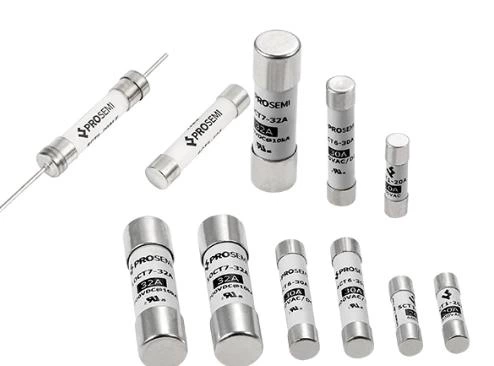Fuses vs Circuit Breakers: What’s the Difference?
In any electrical system—whether it's in your home, an industrial plant, or inside a piece of consumer electronics—overcurrent protection is essential. Two of the most commonly used protection devices are fuses and circuit breakers. While both serve to interrupt excessive current and prevent damage or fire, they operate in very different ways.
This article explains the working principles, advantages, limitations, and application scenarios of fuses and circuit breakers, helping you decide which one fits your needs.
1. Working Principle: One Melts, One Switches

(1)Fuse
A fuse is a single-use device. It contains a metal wire or filament that melts when too much current flows through it, thereby breaking the circuit.
Example: If a short circuit occurs while you're using a high-wattage hairdryer, the fuse melts instantly and cuts off the current, preventing wire overheating or fire.
(2)Circuit Breaker
A circuit breaker, on the other hand, uses an electromechanical mechanism. It detects overcurrent using thermal (heat-based) or magnetic (current-based) sensors and flips a switch to disconnect the circuit.
Example: In an office, if the air conditioner draws too much power, the breaker will trip. Once the issue is resolved, you can manually reset the breaker—no replacement needed.
2. Response Speed and Accuracy
| Feature | Fuse | Circuit Breaker |
|---|---|---|
| Response Time | Very fast (sub-ms) | Slower (adjustable delay) |
| Accuracy | High | Moderate to high |
| Reusability | No | Yes |
Fuses are ideal for fast, sensitive protection, especially for delicate electronics.
Circuit breakers are better for general-purpose and reusable protection, particularly where uptime matters.
3. Maintenance and Cost
-
Fuses need to be replaced once blown. They’re cheap but require downtime and manual intervention.
-
Circuit breakers can be reset easily, reducing long-term maintenance costs despite higher upfront prices.
4. Typical Applications
| Scenario | Preferred Protection |
|---|---|
| Semiconductor protection (MOSFET, IGBT) | Fuse (fast-acting) |
| Household power distribution | Circuit breaker |
| Industrial machinery main circuit | Circuit breaker |
| Embedded electronics or PCBs | Fuse |
| Lithium battery short protection | Fuse |
5. Can You Swap Them?
Not really. While both are overcurrent protection devices, their performance characteristics differ:
-
Use a fuse when precision, speed, and compactness are critical.
-
Use a circuit breaker when reusability, easier reset, and system monitoring are priorities.
Always choose based on application requirements like maximum load current, reset needs, environmental conditions, and fault type.
6. Summary: Which One Should You Choose?
| Comparison | Fuse | Circuit Breaker |
|---|---|---|
| Speed | Faster | Slower but adequate |
| Reset/Reuse | No | Yes |
| Maintenance | Replace after trip | Manual reset |
| Cost (unit) | Lower | Higher |
| Protection Precision | Higher | Lower to moderate |
| Best for | Sensitive devices | Power systems and panels |
In short:A fuse is like a one-time-use "safety wire," while a circuit breaker is a resettable "intelligent switch."
Need help selecting the right protection for your circuit? Let me know the voltage, current range, and application scenario, and I’ll help you narrow it down.